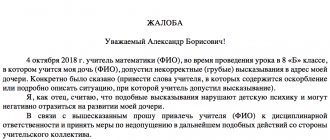Photo source stockking/freepik
“I won’t go to school, the teacher offended me”; “Our teacher is rude and calls names all the time, right in class”; “Our teacher said today that although I have glasses, I’m not smart at all. And all the children started laughing”... Wild stories? It can not be so? Does your child make things up? A teacher can't behave like that?
It turns out it can. And such cases are not at all rare, especially recently. What to do? Do not mention it? Perhaps this is a pedagogical method, and the teacher does not break any rules?
A teacher has no right to insult a student
And this is not only a moral, but also a legal norm.
Federal Law “On Education in the Russian Federation” N 273-FZ on the duties and responsibilities of teaching staff very clearly defines that teaching staff are obliged to respect the honor and dignity of students and other participants in educational relations.
That is, if you are sure that the child was actually insulted or humiliated, this problem needs to be dealt with. And if this is proven, the teacher will face punishment, up to and including dismissal.
Or maybe there was no insult?
This also happens. Children are touchy. And a harmless remark from a teacher may seem like a real tragedy to a little person with a great sense of self-worth.
In this case, the parents must first understand for themselves whether an insult has taken place. For example, a little girl was offended when the teacher reproached her for constantly being late for classes: “Vika, you sleep too deeply. You probably have very warm pajamas and a very soft bed?” Classmates laughed, and the schoolgirl began to cry. Mom, having learned about this, was at first indignant, and then decided to turn it all into a joke. At the “family council” they came to the conclusion that we needed to leave the house early, and that was the end of it. The child calmed down. The incident is over.
Another case is not so harmless. A schoolboy came to school after the holidays with a new hairstyle and dyed hair. The physical education teacher began to make dirty jokes about him about the fact that “now he’s not sure which group to put him in – girls or boys. And is he safe in the locker room? This can already be qualified as an insult to a student by a teacher. In this case, parental intervention is quite appropriate.
An insult is considered a public humiliation of dignity. Where to draw the line between a harmless joke and humiliation is primarily up to you to decide. And later, perhaps, to lawyers.
Photo source stockking/freepik
Where to turn if you think your child is being humiliated by a teacher?
First of all, experts advise finding out whether such behavior is the norm for a teacher. Does he insult other students or is it only yours who is “lucky”?
If boorish behavior is generally characteristic of a given teacher, it would be useful to collect signatures from other parents. This is no longer the subjective opinion of one person, but a collective complaint. It definitely has more weight.
But even if only your child is abused, this cannot be left unpunished.
There are two schools of thought about what a parent should do if they believe their child is being abused by a teacher. The difference is whether it makes sense to talk with a boorish teacher or you need to go straight to the director.
Those who are sure that a “preventative” conversation can solve the problem rely on the common sense of the teacher. Seeing that the parents are aware of what is happening at school with the child, he will be more careful in his expressions. In addition, we cannot exclude the possibility that he treats the child/children very well and simply does not understand that he is insulting them with his awkward phrases. Your remark will help him correct his behavior.
Supporters of tough measures are confident that the teacher’s rudeness will not go away after talking with parents, and may even intensify. Such people should not work with children, they need to be “educated”, and it is better to fire them immediately.
Under no circumstances should you start a conversation in a raised voice. If there has been a misunderstanding, your aggressiveness will be completely inappropriate. And if you are dealing with a professional boor, you should not play on his field.
I think it’s still worth talking to the teacher. In any case, it will be useful to hear his position - at least in order to prepare counterarguments. For a conversation on a different, higher level.
Who might be the victim?
Psychologist Galina Shvets says that any child can fall out of favor with a teacher.
It happens that a student regularly attends all lessons, completes homework and writes tests well, but the teacher still treats him with disdain. The reason for hostility and insults on his part may be some external features or character traits of the student - excess weight, too tall/short stature, hyperactivity/slowness, clothing and even birthmarks.
“My first teacher hated me. She took it out on me and treated me very disrespectfully and contemptuously. But at that moment I did not understand that the reason was not in me, and I thought that I deserved such an attitude.
Now I understand that I just irritated her and she took out her anger in this way. As a child, I walked around with plates, and food residues constantly accumulated in my mouth after eating. She called me to the board with the phrase: “Kazantseva, show me what’s in your mouth.” And I stood in front of the whole class with my mouth open and felt like I was in a circus. It’s good that my mother quickly responded to this and transferred me to another class,” says psychologist Veronika Kazantseva.
Often children do not understand why the teacher is opposed to them, so they begin to look for reasons within themselves. This is how complexes are born, the desire to go to classes with this teacher and generally study the subject disappears.
“Most often, teachers who bully children have themselves been bullied, humiliated, or violated by adults. This is the pain that they act out on their students,” explains Ekaterina Materina, an educational psychologist with 17 years of experience. Therefore, the cause of “teacher bullying” may be the same factors due to which the teacher himself was once attacked.
Meeting with the director
Many parents, having been confronted with the bullying of their child at school, do not want to get involved with this educational institution at all, but immediately look for the truth at the highest level: “this is corporate ethics,” “everyone will cover for each other,” “you won’t achieve justice.”
It is not right.
If you want to complain about a teacher, the first resort is to contact the director. And here it is no longer enough to simply “come to talk”: a complaint about the unlawful behavior of a teacher must be submitted in writing.
In any form. Just describe what actions of the teacher you think are unacceptable. It’s very good if you have proof - for example, a recording on your phone.
It's even better if your complaint is supported by other parents.
A complaint against a teacher must be made in free form in writing. Naturally, the application must include your contact details, information about the child and details of the teacher about whom you are complaining. The appeal must necessarily contain a requirement to check all the circumstances and take the necessary measures. It must be drawn up in two copies and officially registered with the secretary of the educational institution.
The director is given 30 days from the date of submission of the application for consideration (be sure to note: the date and registration number must be stamped on the application). One copy remains with you.
You will definitely receive a response to such a letter. Moreover, 30 days is the official period for responding to such statements. You have the right to request a trial within a shorter period of time - 15 or even 10 days. But this must be reflected in the application.
Photo source Racool_studio/freepik
Explanatory letter from the teacher regarding the parents' complaint
If a complaint is received from the child’s parents, the teacher has the right to write an explanatory note in his own defense. There is no unified form of the document. However, the school management has the right to approve it.
Attention
The teacher’s explanatory letter to the parents’ complaint is drawn up in a single copy. To compile it, use a blank A4 sheet. The paper should contain an explanation of the situation. The document can be handwritten or printed on a computer. The paper must contain the names of the participants in the situation, the date the paper was compiled, and the teacher’s signature.
Higher authorities
There are often cases when the director’s answer does not satisfy the child’s parents.
The most effective remedy against a boorish teacher and school management who turn a blind eye to what is happening is a complaint to the Department of Education. It exists at the local level (municipality) and at a higher level – regional (subject of the federation).
The lower the level, the faster the review will take place. Each application must be accompanied by a copy of the response from the lower authority.
Contacting official organizations will necessarily entail verification. If the facts stated in your complaint are confirmed, not only the teacher, but also the director will be punished. As a rule, disciplinary liability is imposed on the teacher, and administrative liability is imposed on the management.
Why conflict situations arise
Some teachers, having learned about complaints against them, try to shift the blame for what happened onto the shoulders of the student. For example, a child did not obey and behaved extremely badly, which forced the teacher to take extreme measures. However, in the Federal Law “On Education” there is not a single clause that allows a teacher to cross acceptable boundaries.
Have a question for a lawyer? Ask now, call and get a free consultation from leading lawyers in your city. We will answer your questions quickly and try to help with your specific case.
Telephone in Moscow and the Moscow region: +7
Phone in St. Petersburg and Leningrad region: +7
Free hotline throughout Russia: 8 (800) 301-39-20
Therefore, in a conflict between a teacher and a student, the teacher is always to blame. This also applies to situations where the child does not listen to the teacher and behaves defiantly. The reason for this is not so much the “depravity” of the minor, but the inability of the teacher to earn respect and interest the student.
Most often, conflicts arise due to the following mistakes of teachers:
- abuse of authority;
- inability to use certain educational methods in practice;
- use of prohibited methods of education.
To Moscow, to Moscow...
Don't give up if you feel like the local level hasn't paid enough attention to your problem.
After you have received a response from the regional education department and it does not satisfy you, you can contact the Russian Ministry of Education.
But not before. Naturally, the law does not prohibit filing a complaint directly with the highest authority, even the Presidential Administration - but you need to understand that if an appeal to a government body is not preceded by a complaint at a lower level, the Ministry of Education will simply redirect it for consideration to a municipal body.
It is not necessary to travel to the capital to file a complaint. It can be sent in writing, either by regular mail or electronically.
A written complaint is sent by Russian Post or courier or transport companies to the address: 127006, Moscow, st. Karetny Ryad, 2. An email can be sent to
Also on the website of the Ministry of Education there is a special resource for collecting complaints and appeals -.
Anonymous complaint against a teacher
Worried about the well-being of the child and his future relationship with the teacher, parents seek to write an anonymous complaint. However, such claims are usually not considered. This is due to the fact that the response to the received document must be sent to a specific address. If it is missing, employees of authorized bodies will not be able to report on the measures taken.
Attention
There are exceptions to the rule. If the document reports information about serious violations by teachers, an audit may still be carried out.
Such situations include:
- threats of terrorist acts;
- crime against the life of a student;
- crime against the health of students.
An anonymous complaint is drawn up according to a standard template, but the personal data of the applicant is not indicated.
Going to court
There are times when the traditional parenting horror story of “I will go to court” actually makes sense. This is a situation where psychological or physical violence is used against a child,
In this case, you don’t have to waste time with administrative authorities at all, but immediately contact law enforcement: the police, the prosecutor’s office. You can also go to court.
But here you need to understand that going to court is advisable when there is harm that can be assessed from a material point of view. In this case, you can count on compensation for property and moral damage expressed in monetary terms.
Author of the article
Syplyva Yulia










